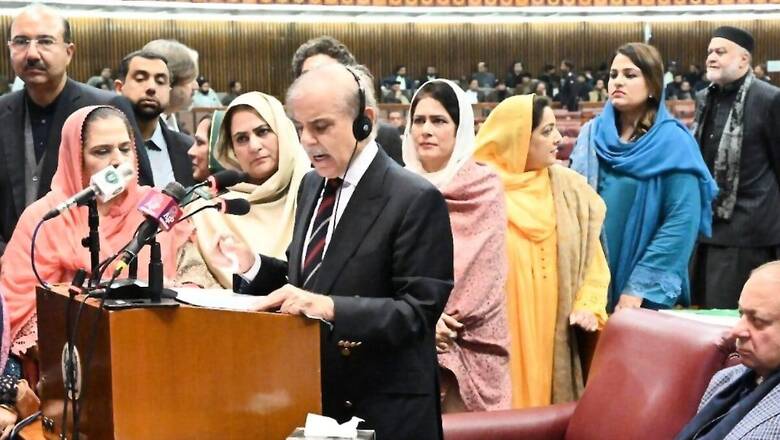
views
Pakistan has a new coalition government with Shehbaz Sharif, representing the Pakistan Muslim League-Nawaz (PML-N), assuming the country’s premiership once again with the backing of the Bhutto-Zardari family’s Pakistan People’s Party (PPP) and powerful military. However, despite this coalition government taking up the civilian mantle of power in Pakistan, the protests on the streets by the common people and the sentiments on social media against the rigging of election results cast a shadow on the legitimacy of this new government.
Prima facie, the 2024 Pakistan elections for the national assembly and the provinces remain contested because of the brazen voting manipulations orchestrated by the military-dominated establishment. Shehbaz Sharif, as the prime minister ‘select’, cannot overlook his party’s involvement in undermining the electoral mandate of the Pakistani people, who evidently showed overwhelming support for the candidates of the incarcerated former Prime Minister Imran Khan’s Pakistan Tehreek-e-Insaaf (PTI).
The legitimacy of the election results, upon which the new government has been built, remains highly disputed due to the manipulation and orchestration by the Election Commission of Pakistan (ECP). It has become widely known that the establishment, which exerted significant effort in the preceding months to decimate PTI, was taken aback by the people’s defiance of the military’s fear. This resulted in a popular mandate for his party. Neither the ECP nor the military establishment nor its political beneficiaries can wish away the memory of its televised fraud on the people of Pakistan to manipulate what it deemed as an unfavourable electoral outcome, despite its countless machinations to secure a pro-establishment result.
It may be recalled that as Pakistan’s Election Commission began releasing the vote count trends following the conclusion of polling on February 8, 2024, it immediately became apparent that a significant majority of Pakistanis had thrown their support behind the candidates fielded by the imprisoned Khan’s Tehreek-e-Insaaf (PTI). At one point in time, during the midnight hours of February 8-9, the voting trends showed that the PTI candidates were surging far ahead with unassailable leads in as many as 170 seats, with their margins extending into the thousands of votes over their closest rivals. However, this moment of clarity was short-lived, as the declarations of vote trends were abruptly halted by the ECP, prompting widespread speculation and apprehensions regarding the motives of the election authority and its backers within the military establishment.
The popular apprehensions of the voting manipulation, which has a long precedent in the country’s not-so-bright electoral history, were once again validated as the Election Commission bought inexplicable time to delay the declaration of results. It is amidst this information fog during the extended delay by the poll body that witnessed the heavy vote leads of PTI nominees abruptly shrinking, only to be reversed to unprecedented yet brazen degrees, shocking people beyond despair.
It became increasingly evident that the military establishment was unwilling to leave anything to chance to safeguard its grip over Pakistan’s political landscape and hence engineered a result to ensure that it retained the controlling strings as a political reality was manufactured from this trampled mandate.
Consider the case of Barrister Salman Akram Raja, a prominent leader of Imran Khan’s PTI contesting from Lahore’s NA-128 constituency. Initial data from Form 45s initially disclosed by the ECP for the 392 polling stations of the constituency before the interruption of vote trend announcements on the night of February 8-9, showed Barrister Raja maintaining a substantial lead of over 82,000 votes against his closest rival, Aun Chaudhry. However, when the ECP eventually released the final result through Form 47, which aggregates data from all Form 45s in a constituency, on the evening of February 9, the narrative had dramatically shifted. Overnight, Barrister Raja’s formidable lead had vanished, dwindling to a deficit of nearly 12,000 votes, thereby relegating him to the runner-up position in NA-128.
The ECP-issued Form 47 showed Raja secured a total of 159,024 votes, while the earlier lagging Chaudhry was declared victorious with a vote count of 172,576. This overnight abrupt yet blatant manipulation of the results rightly put a question mark on the already tainted reputation of ECP, not merely because of this fraud but because of the brazen manner in which it was carried out.
Likewise, in the case of NA-47 Islamabad, the Form 45 data of PTI’s Shoaib Shaheen showed his vote count at 1,01,596 against PML-N’s Tariq Fazal Chaudhry’s 48,678, and hence a lead of over 51,000. However, as per ECP’s result notification, Shaheen’s five-figure lead inexplicably dissipated as it declared Chaudhry the winner with a vote count of 101397 and the PTI nominee at the runner-up position with 86,796 votes.
With similar manipulative machinations at play in other two constituencies in Pakistan’s federal capital, NA-46 and NA-48, the provincial Islamabad High Court has since suspended ECP’s result notification on February 19, 2024, as legal challenges against the voting manipulation picked pace across the country. As such, from the initial estimation of an overwhelming victory for the PTI candidates, the subsequent manipulation rendered the mandate split with no electoral bloc in a position to form a government of their own. The establishment favoured PML-N of the Sharif family, whose Chairman Nawaz Sharif’s return from self-imposed exile in London was facilitated by withdrawing his prior corruption indictments, and Bhutto-Zardari’s PPP. They had won 75 and 54 seats respectively, whereas PTI-backed nominees still managed to hold ground in 92 seats despite the rigging.
The Pakistanis feel that these blatant voting manipulations have turned the government of PML-N and PPP into a façade. This government has been formed at the behest of the military establishment, without popular support. As a matter of fact, the manner in which these parties have engaged in distributing government portfolios flies in the face of their earlier self-championing of the democratic principles in the country.
It may be recalled that these two parties, along with smaller ones, had entered into a Charter of Democracy in 2006 to limit the influence of the Pakistan Army in the political affairs of the country and strengthen the roots of democracy. Now they are ready to accept the patronage of the same military and turn a blind eye to blatant electoral manipulations. This also demonstrates how the question of ‘legitimacy’ has taken a back seat in Pakistan’s polity. How long this legitimacy-less government would last could be anyone’s guess.
The writer is an author and columnist and has written several books. His X handle is @ArunAnandLive. Views expressed in the above piece are personal and solely that of the author. They do not necessarily reflect News18’s views.




















Comments
0 comment